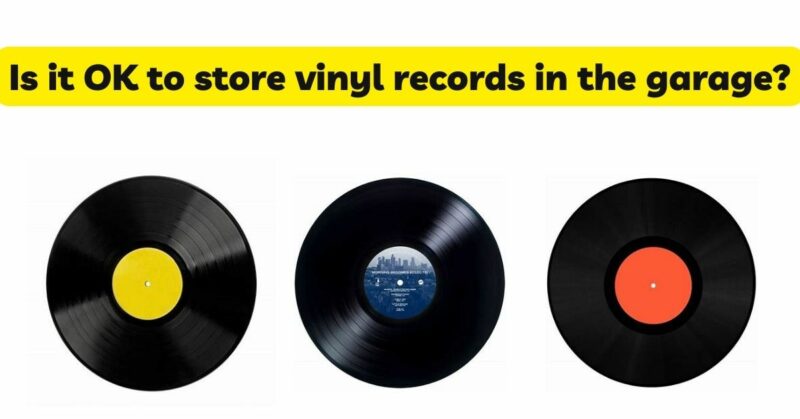Vinyl records have experienced a resurgence in popularity, captivating music enthusiasts with their warm sound and nostalgic charm. As vinyl collections grow, the issue of storage becomes a crucial consideration. While the garage might seem like a convenient storage space, it poses certain challenges that could potentially harm vinyl records. In this article, we will explore the advantages and disadvantages of storing vinyl records in the garage, discussing the risks they may face and providing guidance on how to mitigate potential damage.
Benefits of Storing Vinyl Records in the Garage:
- Ample Space: Garages often offer generous storage space, making it an appealing choice for vinyl record enthusiasts with substantial collections. The garage’s size allows for the organization and display of records without cluttering living spaces.
- Accessibility: Storing vinyl records in the garage can provide easy access to your collection. You can create a dedicated space for your records, allowing for convenient browsing and retrieval whenever you want to enjoy your favorite albums.
Challenges and Risks:
- Temperature Fluctuations: One of the primary concerns of storing vinyl records in the garage is the wide temperature fluctuations that occur in this space. Garages are typically not climate-controlled, leading to temperature variations depending on the weather and the time of year. Extreme heat during the summer or cold temperatures during winter can pose risks to the integrity of vinyl records.
- Heat Exposure: Vinyl records are susceptible to heat damage. When exposed to high temperatures, the vinyl material can warp or even melt, rendering the record unplayable. Garages, especially those without proper insulation, can experience significant heat buildup, particularly in hotter climates or during heatwaves.
- Humidity and Moisture: Garages are notorious for being prone to humidity and moisture. High levels of humidity can cause mold growth, warping of records, and damage to the record sleeves. Moisture can also result in the degradation of album covers and the growth of mildew, further compromising the quality of your vinyl collection.
- Dust and Dirt: Garages are typically dusty environments, with dirt and debris easily finding their way inside. Dust particles settling on vinyl records can lead to surface scratches and affect the sound quality during playback. Additionally, dirt and grime can accumulate on the stylus, causing potential damage to both the record and the turntable.
Protecting Vinyl Records in the Garage:
While storing vinyl records in the garage poses risks, it is possible to take measures to protect them adequately. Here are some essential tips to mitigate potential damage:
- Climate Control: Consider investing in climate control solutions for your garage. Installing a heater, air conditioner, or dehumidifier can help regulate temperature and humidity levels, reducing the risks of heat damage and moisture-related issues. This option may require professional assistance and could entail additional costs, but it ensures a controlled environment for your vinyl collection.
- Insulation: If climate control is not feasible, focus on insulating the garage to minimize temperature fluctuations. Adding insulation to the walls, ceiling, and garage door helps maintain a more stable environment and protects the records from extreme heat or cold.
- Proper Storage: Use high-quality record storage solutions to safeguard your vinyl collection. Invest in sturdy, dust-resistant record shelves or cabinets designed specifically for vinyl records. Ensure that the records are stored vertically, as horizontal stacking can lead to warping over time.
- Inner Sleeves and Outer Covers: Replace worn or damaged inner sleeves with new anti-static sleeves to minimize the risk of scratches and dust buildup. Outer covers should be sturdy and protective, shielding the records from potential exposure to dirt and dust.
- Elevation: Avoid placing vinyl records directly on the floor of the garage. Elevate storage units or shelves to prevent contact with any moisture that may seep in from the ground. Concrete floors, in particular, can accumulate condensation, posing a risk to the records.
- Regular Cleaning and Maintenance: Maintain a regular cleaning routine for your vinyl records. Use a carbon fiber brush or anti-static cleaning cloth to remove dust before and after each play. Clean the stylus regularly to prevent dirt buildup and ensure optimal sound quality.
Conclusion:
While the convenience and space offered by garages make them tempting for vinyl record storage, they also present significant risks due to temperature fluctuations, humidity, and dust. Proper precautions must be taken to protect vinyl records from heat damage, warping, and other environmental factors that can degrade their quality. Whether through climate control solutions, insulation, or careful storage practices, it is possible to mitigate these risks and ensure the longevity of your beloved vinyl collection. Remember, preserving vinyl records is not just about safeguarding music; it is about cherishing a cultural and artistic legacy for generations to come.


